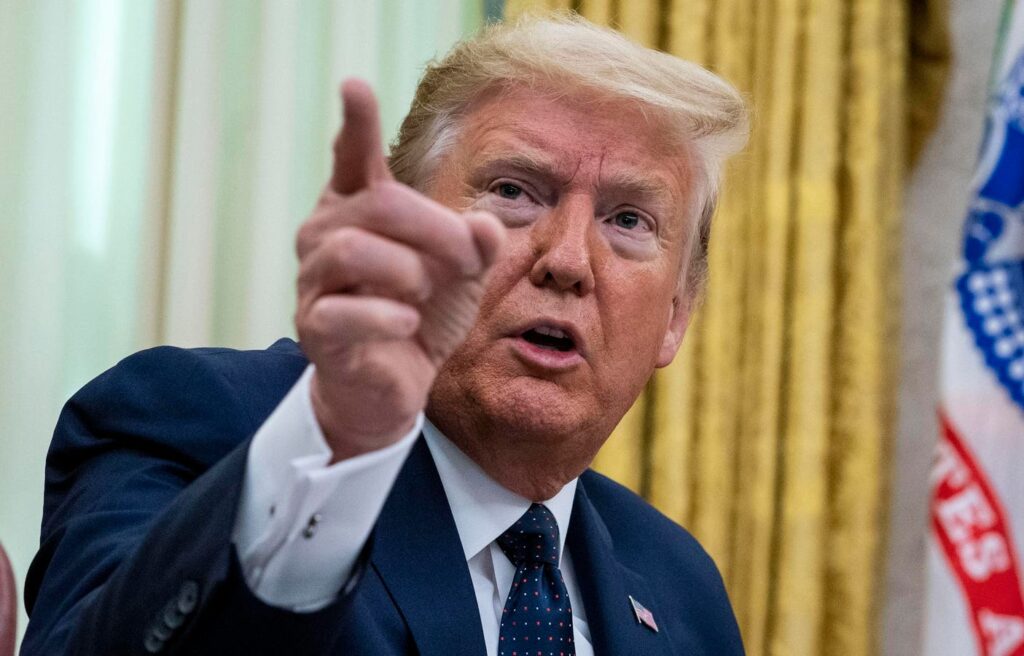President Donald Trump speaks in the Oval Office in Washington, DC. (Photo by Doug Mills-Pool/Getty … More
Getty ImagesA federal appeals court ruling may have handed President Trump, along with future presidents, a powerful new tool: The ability to shape White House coverage by deciding who gets through the door — and who doesn’t.
It’s the latest chapter in the Trump administration’s ongoing war with the press – and it’s arguably flown a bit under the radar, given the president’s bellicose response to the anti-ICE protests that have rocked downtown Los Angeles for several days and continue dominating headlines. But while public attention has been preoccupied with the demonstrations there, a court ruling has just effectively given Trump the authority to control who’s allowed into the White House press pool.
In a 2-to-1 decision on Friday, the D.C. Circuit Court of Appeals temporarily paused a lower court’s order requiring the Trump White House to allow Associated Press reporters to participate in daily press events and presidential travel.
At the heart of the case was an argument that areas like Air Force One and parts of the West Wing aren’t public forums — and, therefore, the White House can choose which journalists it admits.
While that may be technically true, its implications for how political power interacts with the press — and how the press, in turn, covers those in power — are enormous. “We are disappointed in the court’s decision and are reviewing our options,” Patrick Maks, director of media relations & corporate communications for The Associated Press, told me on Monday.
The dispute began earlier this year, when the White House began putting new press limits in place and excluded AP journalists from the daily press pool altogether. The move came after the AP opted not to use President Trump’s preferred designation of the “Gulf of America” instead of the Gulf of Mexico. When the AP declined, the White House retaliated — and has largely kept the outlet shut out ever since.
It might sound like a minor dust-up over wording, but here’s why this case could signal the potential erosion of a decades-old system meant to ensure fair, consistent access to the presidency.
Press access is not a prize for playing nice.
For decades, news organizations have relied on the press pool system to share coverage duties.
There isn’t always space for dozens of reporters to cram into every presidential setting — like inside a motorcade or aboard Air Force One — news outlets rotate the job of sending a reporter, who then shares notes and recordings with the rest of the press corps. It’s a practical solution, not a privilege.
Or, at least, it was a practical solution that the Trump White House wants to treat as a privilege that can be extended or revoked, depending on a reporter’s or outlet’s coverage.
Why that’s troubling: The moment a White House begins picking and choosing who gets into the pool based on editorial compliance, the system starts to look more like a velvet rope — one that’s controlled by gatekeepers intent on rewarding allies and shutting out the rest.
Trump’s win could let future presidents pick their press.
The court’s decision doesn’t just delay the AP’s reinstatement; it could end up setting a precedent. In the majority opinion, Judge Neomi Rao, joined by fellow Trump appointee Gregory Katsas, noted that many of the places where reporters follow the president are “nonpublic forums.” That means the First Amendment’s protections don’t apply in the way many journalists might expect.
In other words, administrations can now claim broad discretion over who gets invited inside — and who doesn’t. Which begs the question: How is what happened to the AP functionally different from making members of the pool sign a pro-Trump pledge in exchange for access?
Rewriting The Rules Of Access
The AP, as noted, held its line. It stuck to the Gulf of Mexico nomenclature, arguing that such phrasing contradicted its newsroom standards. That principled stance cost it access.
If other outlets take the same stand in the future, whether because of language used or some clash with editorial policy, they could now face similar repercussions. In other words, what happened here between the Trump White House and the AP feels like a shift in the very economy of access. It’s a kind of penalizing of dissent, which correspondingly implies that loyalty will be rewarded.
The press pool was never meant to function like a velvet rope. But this pro-Trump ruling could mean that’s exactly what it might soon become — letting only the favored few through, and leaving the rest at a disadvantage while they scramble to report from outside the room.
Read the full article here


